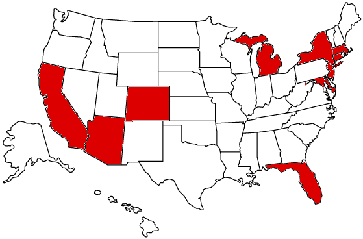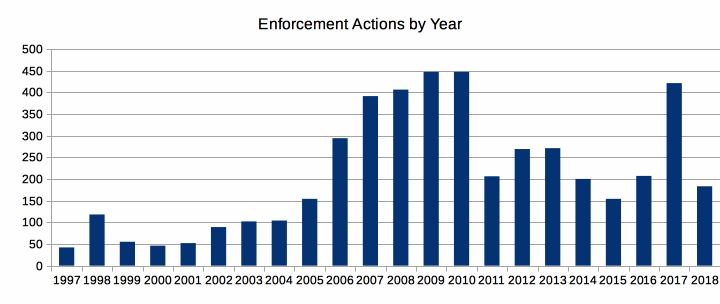Can’t say for sure, but the latest update to the Enforcement Action Database seems to suggest it, as the agency considers drastically cutting their already meager ranks. As of the end of April, there’ve been just 35 enforcement actions against 17 stations in four states. There has been no official report of field activity in May. In 2014, there were 52 enforcement actions in the same time-frame.
 2014 saw the lowest level of FCC enforcement activity against unlicensed broadcasters in nearly a decade. Where agents are active, New York continues to lead the way, followed by New Jersey and California. A station in Colorado also got a warning letter this year, but that was a follow-up to a visit last year. Continue reading “In Face of Downsizing, Are FCC Agents Pulling Back?”
2014 saw the lowest level of FCC enforcement activity against unlicensed broadcasters in nearly a decade. Where agents are active, New York continues to lead the way, followed by New Jersey and California. A station in Colorado also got a warning letter this year, but that was a follow-up to a visit last year. Continue reading “In Face of Downsizing, Are FCC Agents Pulling Back?”
Category: Pirate Radio
Congress to Investigate FCC Enforcement Cuts
A one-two punch on Capitol Hill for the FCC’s plan to decimate its field enforcement presence. The chairman of the House Committee on Energy and Commerce chair Fred Upton (R-MI) dropped a letter on FCC Chairman Tom Wheeler April 23rd demanding all agency documentation, “including all drafts, memos, emails analyses, PowerPoint slides, interim reports, and the final report related to your proposal to close FCC field offices,” as well as “all internal communications and internal analyses, related to the Enforcement Bureau and Office of Managing Director joint recommendtion to the commission to close the FCC field offices.”
The FCC has until this Thursday (May 7) to respond. At present, Congress is working on the same stuff leaked to the public earlier this month. Continue reading “Congress to Investigate FCC Enforcement Cuts”
Document-Dump Details FCC Enforcement Cutbacks
All hail Michael Marcus: one of the policy-fathers of wi-fi and Bluetooth (and a man with unimpeachable FCC bona-fides) has released a compendium of documents regarding plans for the FCC’s radical shrinking of its Enforcement Bureau.
The cache has three parts: a letter from FCC Chair Tom Wheeler to Greg Walden (R-OR), a member of the House’s Committee on Energy and Commerce; a memorandum to FCC field staff from Enforcement Bureau Chief Travis LeBlanc and FCC Managing Director Jon Wilkins; and a PowerPoint slide summary of the outside consultant’s work, conducted by Oceaneast Associates and Censeo Consulting Group.
Here’s what it tells us: Continue reading “Document-Dump Details FCC Enforcement Cutbacks”
Should Broadcasters Sue Pirates?
In many respects, I feel sorry for FCC Commissioner Mike O’Rielly. He’s the #2 Republican on the five-member panel – the politically-weakest Commissoner. And he’s had to languish in the shadow of fellow Republican Ajit Pai, who’s commandeered the minority party’s bully pulpit on a plethora of issues ranging from journalistic independence to network neutrality.
So O’Rielly’s got to make a name for himself somehow, and he’s choosing pirate broadcasting as an issue on which to try. Last week, he published a blog post wherein he lays out some cockamamie suggestions on how to handle “the sourge” that is unlicensed broadcasting. Key to O’Rielly’s proposal is…the CAN-SPAM Act? Continue reading “Should Broadcasters Sue Pirates?”
Reactions to FCC Enforcement Downsizing
On the heels of some Congressional inquiry into the the FCC’s plan to radically cut its field enforcement resources, the National Association of Broadcasters finally chimed in. In a post titled “Defanging a Paper Tiger” (hm, where have I heard that term before?), NAB VP of Spectrum Policy Bob Weller gave the idea two big thumbs down.
Weller, who joined NAB last year after several years with the FCC working spectrum policy/enforcement issues, says the new proposal effectively undoes a service-cushion implemented by the agency when it last downsized its enforcement resources some 20 years ago: Continue reading “Reactions to FCC Enforcement Downsizing”
Massive Cuts Planned to FCC Field Enforcement
A very interesting memorandum was leaked last week to two trade publications detailing a plan to severely reduce the FCC’s enforcement presence in the field. Presently, the agency’s Enforcement Bureau has two dozen field offices scattered throughout 17 states and Puerto Rico. However, not every field office is created equal: there are Regional Offices (many employees), District Offices (a handful of employees) and Resident Agent Offices (one or two people).
According to the American Radio Relay League, two-thirds of all FCC Enforcement Bureau offices would be closed, leaving just half the staff (33 people total) in the field. And their management is positively evicerated: reduced from 21 positions to just five. Continue reading “Massive Cuts Planned to FCC Field Enforcement”
FCC Steps Down Anti-Pirate Enforcement
Just updated the Enforcement Action Database and the signs are pretty clear: unlicensed broadcasting has slipped down the priority-list for FCC field agents. Actions against AM/FM and shortwave pirate stations last year were at their lowest level since 2005, the last time fewer than 200 were logged.

Tactically, even the agency’s penchant for paperwork seems to have slackened. Continue reading “FCC Steps Down Anti-Pirate Enforcement”
AT&T Lightly Chastised for Airwave Piracy
Late last week the Federal Communications Commission released a Notice of Apparent Liability against AT&T for running microwave radio links without the proper licenses. These links are often used as point-to-point backhauls to move data long distances, and sometimes they are used to connect cell nodes in remote locations to the larger network.
The shenanigans first came to light in 2011, when the FCC found an AT&T microwave link in Puerto Rico that was operating on the wrong frequency. The company subsequently conducted a review and found that hundreds of its microwave links were operating outside of licensed parameters and, in some cases, were not licensed at all. AT&T claims these links were part of acquisitions it made from 2009-2012, and in simple terms neglected to file the right paperwork to adequately license them. But the scale of the problem isn’t minor: at least 240 point-to-point microwave licenses in all require either major modifications or minor modifications to be brought into compliance. All have been operating outside license parameters (or without licenses at all) for three to four years. Continue reading “AT&T Lightly Chastised for Airwave Piracy”
NYC Pirates Need a Needle Exchange
Having lived here for a couple of years now, it’s true that New York City is a melting pot of culture like few other places. Sure, there’s Manhattan, from where the most nationally-recognizable symbols of the city’s culture emanate, but each borough’s got its own flavor, with distinctive neighborhoods and narratives.
This is very true for the radio dial. And of the five boroughs, nobody’s airwaves are more active than Brooklyn. Last year, I conducted a bandscan of receivable FM stations from my location on the Midwood/Flatbush border and picked up some 30 pirates; now it’s a new year and the FM dial remains alive with them. Somebody’s even established a Twitter feed that tracks (and samples) what’s on the air here. By and large, every frequency from 87.7 to 107.9 has something on it, and where I live there’s a one-in-three chance that it’s unlicensed. You can find everything from Afro-Carribean talk and music to Orthodox Jewish teachings and Hebrew music. There’s also stations devoted to the more mundane, like dance music, gospel, and death metal. Many are commercial, in mom-and-pop fashion. The languages are multivariate, but it’s all live and local, and despite its rough edges this FM dial is vibrant like nowhere else (save London, perhaps). Continue reading “NYC Pirates Need a Needle Exchange”
FCC Enforcement: On the Wane?
Just got the Enforcement Action Database caught up for the year, and the numbers show that FCC field activity is running at the lowest level it’s been since 2005. Just 173 enforcement actions to date, as opposed to ~260 at this time last year.
There was a similar dip in the years afer the FCC first proposed the creation of LPFM, and with LPFM’s second wave in the works it’s enticing to see a correlation, but this time around I’m more inclined to believe it has to do with changing political priorities regarding enforcement policy (pirates take a back seat to cell-phone jammers, for example) coupled with the effects of austerity on federal government services more broadly. Continue reading “FCC Enforcement: On the Wane?”